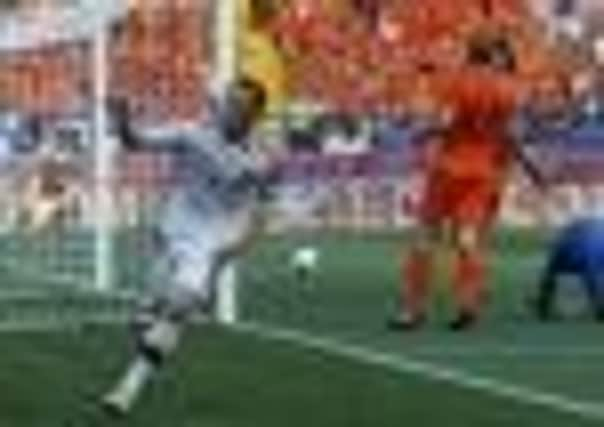Euro 2012: Denmark shows Scotland how to punch above their weight


The obvious limitations of an unremarkable Czech Republic side were brutally exposed for all to see on the opening night of the tournament, their 4-1 defeat to Russia in Wroclaw hardening the sense of how wretchedly Scotland under-performed in their qualifying group to finish two points behind them and fail to secure a play-off berth.
Perhaps Michal Bilek’s men may yet turn their fortunes around in their remaining Group A fixtures against Greece and Poland this week, but their very presence in the finals reinforces the folly of the cowed respect Scotland manager Craig Levein fatefully showed them in Prague back in October 2010.
Advertisement
Hide AdAdvertisement
Hide AdBut if the distinctly average Czechs are irrefutable proof of why Scotland’s first qualifying campaign under Levein was wholly without merit, it is Denmark who have produced the clearest evidence that there is no justifiable excuse for the country’s inability to reach a World Cup or European Championship finals since 1998.


A northern European nation with a population of just 5.5 million, Denmark is an ideal point of comparison for the Scots. They have a similar size of playing resources to draw upon, while their domestic football structure is spearheaded by the 12-team Superligaen.
Yet since reaching the quarter-finals of the 1998 World Cup in France, Denmark have only failed to qualify for the finals of two tournaments – the 2006 World Cup and the European Championships two years later.
Their absence from the 2008 Euros, in fact, was the only occasion they have missed out on the finals of that tournament in the last eight stagings of the event. It is a tremendous record of consistency, highlighted by their extraordinary 1992 triumph when they lifted the trophy in Sweden after being called up as last-minute replacements for the suspended Yugoslavia. The current Danish squad needed no such good fortune to claim their place in the 2012 finals, convincingly winning their qualifying group ahead of a more-fancied Portuguese side and Scandinavian rivals Norway.
Admittedly, they did enjoy more than a little luck in Kharkiv on Saturday evening when they delivered the first shock result of the tournament with their 1-0 win over a mis-firing Netherlands outfit. But the Danes could be said to have earned any breaks which came their way, performing with a collective sense of purpose and firm tactical discipline which allows them to become so much more than the sum of their parts.
Rising star Christian Eriksen is perhaps the only stellar name in the Danish squad, the highly regarded Ajax playmaker likely to emerge as one of European football’s leading lights over the next few years.
But coach Morten Olsen, an old-school manager with the crucial knack of maximising the capabilities of those under his charge, has otherwise constructed his effective side around a group of reliable journeymen. Be honest, how many of you had heard of Michael Krohn-Dehli before he scored his match-winning goal against the Dutch on Saturday? The 29-year-old Brondby striker, who ironically failed to make the grade in Dutch club football earlier in his career, is one of seven home-based players in Olsen’s squad.
Of the rest, only reserve goalkeeper Anders Lindegaard of Manchester United and defenders Simon Kjaer of Roma and Daniel Agger of Liverpool are employed by what would be regarded as among Europe’s elite clubs.
Advertisement
Hide AdAdvertisement
Hide AdAs Croatia and Republic of Ireland, both with populations smaller than Scotland, began their Euro 2012 adventures last night, it was a further reminder that size is no barrier to success.
If the Scots fail to make it to the 2014 World Cup finals in Brazil, it will represent the country’s longest ever absence from major tournament finals since first appearing at the World Cup back in 1954. Should that grim scenario unfold, please don’t let anyone try to say it is simply no more than can be expected.